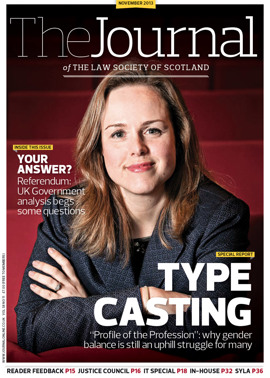Law reform roundup

Criminal Justice (Scotland) Bill
Grazia Robertson from the Society's Criminal Law Committee gave oral evidence on 1 October to the Scottish Parliament, questioning plans to create two categories of arrested person. The Society considers that the current system of arrest and detention is already compliant with the European Convention on Human Rights and is working well.
The Society will provide further oral evidence on proposals to abolish the requirement for corroboration on 26 November. The Society considers that the requirement should not be abolished without the introduction of equally robust safeguards to prevent the risk of miscarriages of justice.
Bankruptcy and debt advice
Rachel Grant from the Insolvency Law Committee provided oral evidence on 30 October to the Parliament on the Bankruptcy and Debt Advice(Scotland) Bill, highlighting the Society's concerns about the transfer of a large number of functions from the courts to the Accountant in Bankruptcy. The Society is particularly concerned about the significant potential for conflicts of interest.
Scottish independence referendum
The Society submitted five amendments on the Independence Referendum Bill, which were subsequently tabled and passed. They ensure that the bill is consistent with earlier legislation on referendums in the Parliamentary Voting and Constituencies Act 2011. One amendment also clarified the basis on which a chief counting officer may be removed.
Lobbying Bill
The Society wrote to Scottish peers concerning the Transparency of Lobbying, Non-Party Campaigning and Trade Union Administration Bill, highlighting its concerns about part 2, which it believes will increase the regulatory burden on charities and could deter them from engaging in public policy debate and discussion.
UK company ownership
The Banking, Company and Insolvency Law Committee responded to the UK Government consultation paper on proposals to enhance the transparency of UK company ownership and increase trust in UK business. The Society welcomed many of the proposals, but considered that the suggestion to amend the Companies Act 2006, to create for banking directors a primary duty to promote financial stability over shareholders' interests, would be difficult to operate in practice. Banking regulators are best placed to determine issues of financial stability, rather than lawyers and courts.
Full details of the above, and further information on the current work of the Law Reform Department, can be found at www.lawscot.org.uk/forthepublic/law-reform-consultations-and-bills The team can be contacted via juliabrown@lawscot.org.uk or follow us on Twitter: @lawscotIn this issue
- Obituary: Professor Ian Willock
- Competition damages – a rocky road ahead?
- Heart of the matter
- Law reform on track
- Turning back the clock
- Golf and the right to roam
- Reading for pleasure
- Opinion column: Ros McInnes
- Book reviews
- Profile
- President's column
- Fee review open to views
- Some more equal than others
- Balancing act
- Paving the road to reform
- Blue sky thinking?
- A singular status
- You pay your money
- Acceptable BYOD use
- Interesting times still
- Aliment in vogue again
- Scottish Solicitors' Discipline Tribunal
- Speakers rise creatively to the challenge
- Why environmental indemnity?
- SYLA presents...
- How not to win business: a guide for professionals
- File reviews - how they can help
- Ask Ash
- Making the Act work
- Law reform roundup
- From the Brussels office
- Fraud alert revived
- "Start the conversation"






